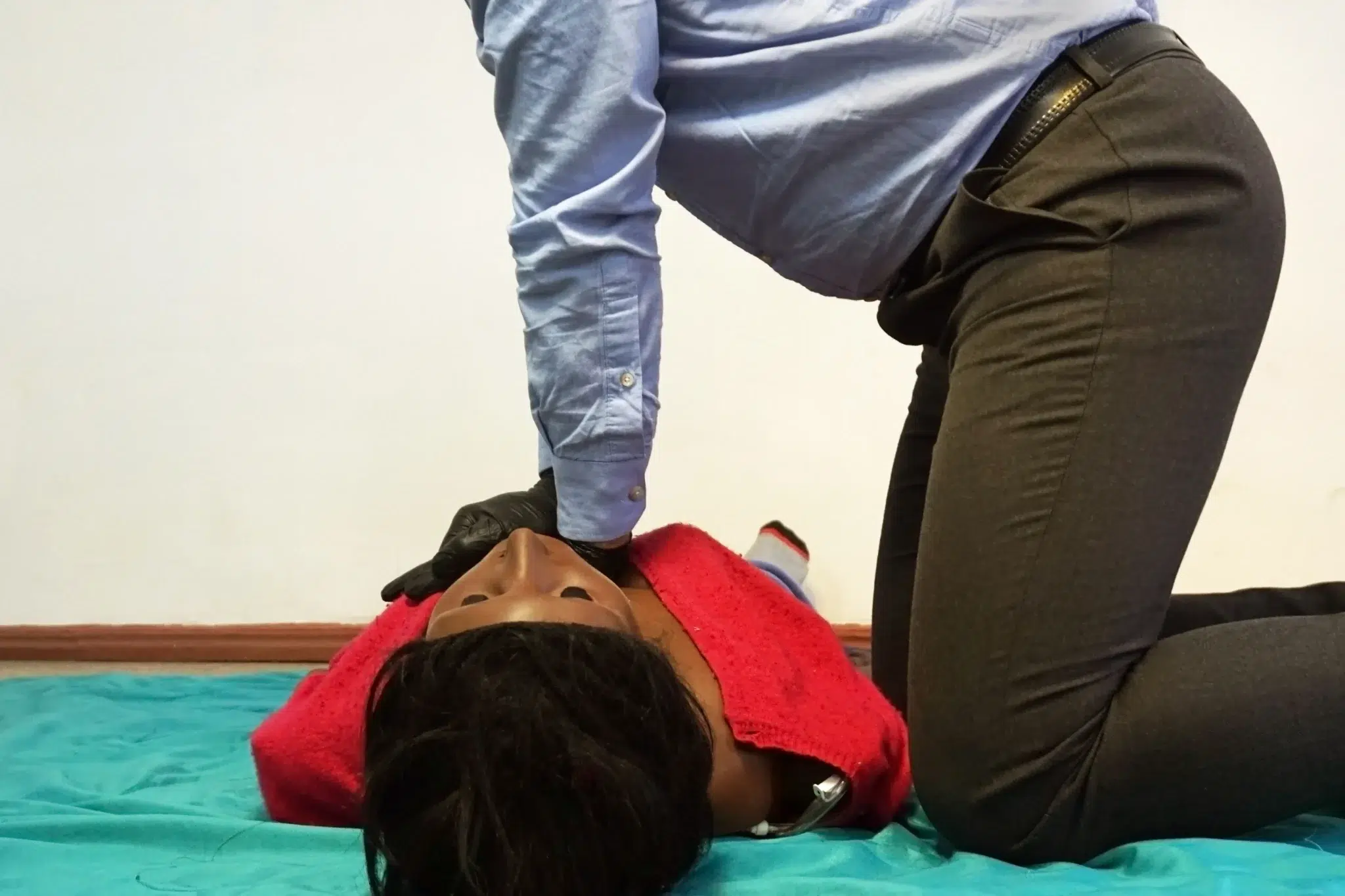Ready to advance your healthcare career in San Francisco and make a real difference in pediatric patient care? PALS HeartCode in SF offers a streamlined path to earning your Pediatric Advanced Life Support certification. This blended learning format combines online modules with a focused in-person skills session, allowing you to learn at your own pace and gain the confidence to handle pediatric emergencies. This comprehensive guide will walk you through everything you need to know about PALS HeartCode in SF, from understanding the course structure and benefits to finding discounts and special offers. We’ll also address common questions and concerns about online PALS training.
Key Takeaways
- HeartCode PALS fits your schedule: The blended learning format lets you complete online modules at your own pace, then schedule a shorter in-person skills session.
- HeartCode PALS provides comprehensive training: This AHA-certified course covers the same material as traditional PALS, ensuring you gain the knowledge and skills to respond to pediatric emergencies.
- HeartCode PALS is accessible in San Francisco: Several training centers offer this convenient and efficient certification option, with various price points and schedules available.
What is HeartCode PALS?
HeartCode PALS is the online portion of the American Heart Association’s Pediatric Advanced Life Support course. It’s a blended learning approach, meaning it’s not entirely online. You’ll complete the coursework and exam online at your own pace, then schedule an in-person skills session with Safety Training Seminars. This combination of online learning and hands-on practice makes HeartCode PALS a flexible option for busy professionals.
How Does it Differ from Traditional PALS?
Traditional PALS courses take place entirely in a classroom setting, with an instructor leading the entire session. HeartCode PALS, on the other hand, lets you study the material independently online. This offers greater flexibility, allowing you to work through the modules when it’s convenient for you. After completing the online portion, you’ll demonstrate your skills in a shorter, in-person session. Both HeartCode PALS and traditional PALS courses result in the same AHA certification.
Benefits of Blended Learning
The blended learning format of HeartCode PALS offers several advantages. The online modules allow you to learn at your own speed, reviewing challenging concepts as needed. This self-paced learning can be particularly helpful for those who prefer to absorb information independently. Plus, the online portion can be completed from anywhere with an internet connection, making it a convenient choice for those with busy schedules or limited access to in-person classes. You’ll still receive the same American Heart Association PALS certification as traditional classes, ensuring you meet the requirements for your profession.
How Long Does HeartCode PALS Take?
One of the biggest advantages of the PALS HeartCode blended learning format is its flexibility. It lets you learn at your own pace and complete the coursework when it’s convenient for you. Let’s break down the time commitment:
Online Learning
The online portion, known as the HeartCode® PALS module, is self-paced. This means you can work through the course material as quickly or as slowly as you need. Some students finish in a single dedicated study session, while others prefer to spread it out over several days or weeks. This flexibility makes it easier to fit the training into your busy schedule. You purchase the online module separately from the American Heart Association.
Skills Session
Once you’ve completed the online portion, you’ll need to attend a hands-on skills session. This in-person session typically takes one to two hours and includes manikin practice and a skills test. During this session, you’ll apply the knowledge you gained online and demonstrate your proficiency in essential PALS techniques.
Total Time Commitment
The total time commitment for HeartCode PALS varies depending on your learning style and how quickly you progress through the online modules. The blended learning approach combines online coursework with a shorter in-person skills session, making it a more efficient way to get your PALS certification than traditional classroom-based courses. You’ll need to factor in time for both the self-paced online learning and the scheduled skills session to estimate your total time commitment.
How Much Does HeartCode PALS Cost in San Francisco?
Understanding the cost of HeartCode PALS is an important step in pursuing your certification. Let’s break down the typical expenses for both initial certification and recertification.
Initial Certification Costs
The initial HeartCode PALS certification involves two parts: an online portion and a hands-on skills session. The online portion, known as the HeartCode PALS Part 1, typically costs around $168. This fee is paid directly to the American Heart Association when you register for the online module. You’ll also need to complete a hands-on skills session with an AHA-authorized Training Center like Safety Training Seminars. The cost of this in-person session varies by provider, so check directly with the training center for their pricing. Safety Training Seminars strives to offer competitive rates; you can find our current pricing on our PALS course page.
Recertification Costs
If you’re already PALS certified and want to recertify, the process is similar. You’ll complete the HeartCode PALS Part 1 online through the AHA and then schedule a skills session. Recertification generally costs around $190, covering both the online and in-person components. Confirm pricing with your chosen training center, like Safety Training Seminars, to ensure you have the most up-to-date information.
Cost Comparison with Traditional PALS
HeartCode PALS offers a blended learning approach, combining online coursework with a hands-on skills session. This format can be more convenient and often more affordable than traditional PALS courses, which typically require more time for in-person instruction. While online costs are consistent across both formats, HeartCode PALS’ flexibility lets you complete online modules at your own pace. This blended learning is particularly helpful for busy healthcare professionals juggling demanding schedules. After completing both portions, you’ll receive your PALS Provider Course Completion eCard, a widely recognized certification.
Where Can I Find HeartCode PALS in San Francisco?
Finding the right HeartCode PALS course in San Francisco depends on your needs and preferences. Here are a few options to consider:
Safety Training Seminars
Safety Training Seminars offers American Heart Association PALS courses in San Francisco, with a focus on improving pediatric patient outcomes. They provide a range of AHA certifications, including BLS and ACLS, making them a convenient option for all your certification needs. Learn more about their PALS training and their low price guarantee.
HeartStart CPR
HeartStart CPR trains thousands of students each year in the San Francisco Bay Area. They offer two-year certifications in PALS and other life-saving disciplines. Visit the HeartStart CPR website for their schedule and course details.
Vital Medical Training
Vital Medical Training offers the blended learning experience of HeartCode PALS. Their website explains that the online portion is followed by a shorter, in-person skills session, usually about one to two hours. This blended learning format offers flexibility for busy professionals.
UCSF Kanbar Center
The UCSF Kanbar Center is an AHA Training Center offering PALS courses for UCSF students, staff, and faculty. If you’re affiliated with UCSF, check out the Kanbar Center website for program details. This might be a convenient option for those already within the UCSF system.
American Heart Association Bay Area CPR
American Heart Association Bay Area CPR offers the traditional PALS Provider Course, giving healthcare providers the skills to manage pediatric emergencies. They concentrate on recognizing and responding to respiratory emergencies, shock, and cardiopulmonary arrest. Find more information on their PALS course.
What Do I Need for HeartCode PALS?
This section covers everything you need for PALS HeartCode training, from prerequisites and materials to helpful study resources.
Prerequisites for Healthcare Professionals
Pediatric Advanced Life Support (PALS) certification is crucial for many pediatric emergencies. While some assume PALS training is unnecessary for experienced healthcare providers, maintaining certification and staying current on best practices benefits anyone involved in pediatric care. Even seasoned professionals can refresh their skills with PALS certification, ensuring they’re equipped to handle emergencies effectively.
Required Equipment and Materials
One of the advantages of the HeartCode PALS program is its streamlined approach. The American Heart Association (AHA) uses the same requirements for initial and renewal courses for HeartCode programs like ACLS and PALS. This means the required equipment and materials are consistent, whether you’re a first-time student or renewing your certification. You’ll complete the online portion, then schedule an in-person skills session. After successfully completing both the online and in-person components of the PALS HeartCode training, you’ll receive your PALS Provider Course Completion eCard.
Study Resources and Practice Tests
HeartCode PALS uses blended learning, combining online coursework with hands-on skills sessions. This offers a flexible learning experience. The online portion adapts to your current knowledge through self-assessment, allowing you to focus where you need more practice. This personalized approach makes HeartCode PALS an effective and efficient way to learn and maintain your PALS certification. You can find additional study resources and practice tests online to strengthen your understanding.
How Do I Schedule HeartCode PALS?
Scheduling your PALS HeartCode certification involves two steps: completing the online portion and then scheduling an in-person skills session. Let’s break down each step.
Accessing the Online Module
After you register for HeartCode PALS and purchase a license, you’ll receive access to the online portion. Head to the American Heart Association’s eLearning portal to activate your license and begin the coursework. This online training allows you to learn at your own pace, pausing and resuming as needed.
In-Person Session Options
HeartCode PALS uses a blended learning approach, combining online modules with a hands-on skills session. Once you’ve finished the online portion, you’ll schedule an in-person skills check with an AHA Training Center like Safety Training Seminars. We offer skills sessions daily across multiple locations, making it easy to find a time that fits your schedule.
Same-Day Certification
After successfully completing both the online modules and the in-person skills session, you’ll receive your PALS Provider Course Completion eCard the same day. This means you’ll be certified and ready to use your new skills immediately. This streamlined process makes HeartCode PALS a convenient and efficient way to get certified.
Common Misconceptions about HeartCode PALS
It’s understandable to have questions about a blended learning course like HeartCode PALS. Let’s clear up some common misconceptions:
Is Online Training Valid?
Many assume online PALS certification isn’t as valid as in-person training. This simply isn’t true. HeartCode PALS follows the same American Heart Association guidelines as traditional courses, covering the same material and requiring the same level of proficiency. The online portion lets you learn at your own pace, while the required in-person skills session ensures you can perform the necessary skills. Successfully completing both parts earns you the same valid PALS certification.
Certification Requirements
Some believe PALS certification is only for doctors and nurses. While it’s certainly crucial for these healthcare providers, PALS certification benefits anyone who works with children, including paramedics, EMTs, respiratory therapists, and other healthcare professionals. Even those outside of healthcare, such as childcare providers, camp counselors, and school staff, can gain valuable skills from PALS training to respond to pediatric emergencies.
Applicability in Healthcare
Another misconception is that PALS certification is only applicable in hospital settings. In reality, PALS training equips you to handle pediatric emergencies in any environment. From a doctor’s office to a school playground, the skills you learn can make a critical difference. PALS certification emphasizes early recognition and response to life-threatening situations, empowering you to provide effective care until more advanced help arrives. Our low price guarantee makes this valuable training accessible.
Get the Most Out of HeartCode PALS in San Francisco
So, you’re considering HeartCode PALS certification in San Francisco? Smart move. It’s a fantastic way to enhance your healthcare career and improve patient care. Let’s explore how this certification can benefit you.
Continuing Education Credits
Many healthcare professionals require continuing education credits to maintain their licenses and certifications. The blended learning format of HeartCode PALS, combining online coursework with in-person skills sessions, often qualifies for these necessary credits. This allows you to conveniently update your skills and fulfill your continuing education requirements simultaneously. Check with your licensing board to confirm how HeartCode PALS certification applies to your specific needs.
Career Advancement
In a competitive job market, certifications like PALS can give you a significant edge. Employers value the dedication to advanced training, especially in specialized areas like pediatric care. Having PALS on your resume demonstrates your commitment to providing high-quality care and can open doors to new opportunities. Heart Start CPR, a well-established training provider, has seen firsthand how certifications like PALS can improve a healthcare professional’s career prospects.
Improving Pediatric Patient Care
Ultimately, the most significant benefit of HeartCode PALS is its impact on patient care. The specialized training equips you with the knowledge and skills to confidently respond to pediatric emergencies. In a fast-paced city like San Francisco, having these skills is crucial. PALS training focuses on the unique physiological differences and health complications in children, leading to better outcomes. This emphasis on pediatric-specific care is further highlighted by Comfikare CPR, underscoring the value of specialized training in this critical field.
Find HeartCode PALS Discounts and Special Offers
Getting certified in HeartCode PALS is an investment in your career and the lives of young patients. Fortunately, there are ways to make the training more affordable. Knowing where to look for discounts and special offers can help you save money without compromising the quality of your education.
Group Rates and Seasonal Promotions
Many training centers, like Heart Start CPR, offer discounts for group registrations. This can be a great option if you work in pediatrics or have colleagues also interested in PALS certification. Contacting providers directly to inquire about group rates is always a smart move. Keep an eye out for seasonal promotions, too. Check training centers’ websites and social media pages for the latest deals.
Package Deals
Some providers bundle courses together, offering a discounted price for combined certifications. If you’re interested in other courses like BLS or ACLS, look for package deals that include PALS. Advanced Medical Certification, for instance, offers various online medical certification courses and related materials in bundles at discounted prices. This can be a cost-effective way to obtain multiple certifications at once. Explore different providers to see what bundled options they have available.
Low Price Guarantees
Look for training centers that offer low price guarantees. Safety Training Seminars, for example, has a low price guarantee on their American Heart Association PALS courses. If you find a lower price for the same course elsewhere, they’ll match it. This ensures you’re getting the best possible value for your training. A low price guarantee takes the guesswork out of finding the most affordable option.
For those in need of comprehensive CPR training, consider enrolling in BLS CPR Classes in Vacaville or BLS CPR Classes in Roseville to keep your skills up to date and ensure you’re prepared for emergency situations.
Related Articles
- PALS Classes in San Francisco (Mission Bay) – San Francisco CPR Classes
- HeartCode BLS Oakland: Your Certification Guide – San Francisco CPR Classes
- HeartCode BLS San Francisco: Your Guide to Online CPR – San Francisco CPR Classes
- American Heart Association Courses in San Francisco – San Francisco CPR Classes
Frequently Asked Questions
What exactly is involved in the HeartCode PALS blended learning format?
HeartCode PALS combines online learning with a hands-on skills session. You’ll study the course material and take the exam online at your own speed. Then, you’ll schedule a shorter, in-person session at a training center like Safety Training Seminars to practice your skills and demonstrate competency.
How long does it take to complete the HeartCode PALS course?
The online portion is self-paced, so the time it takes to complete varies. Some finish in a few focused sessions, while others prefer to spread it out over weeks. The in-person skills session typically lasts one to two hours.
What’s the price difference between initial HeartCode PALS certification and recertification?
Initial certification involves purchasing the online HeartCode PALS Part 1 module from the AHA (around $168) and paying for the skills session at a training center. Recertification follows a similar process but usually costs slightly more, often around $190, including both online and in-person components. Always check with your chosen training center for their specific pricing.
Where can I take the HeartCode PALS skills session in San Francisco?
Several training centers in San Francisco offer the in-person skills session required for HeartCode PALS certification. Safety Training Seminars, HeartStart CPR, Vital Medical Training, and the UCSF Kanbar Center (for UCSF affiliates) are a few options. Check their websites for schedules and availability.
Is the HeartCode PALS certification as widely accepted as the traditional PALS certification?
Yes, absolutely. HeartCode PALS follows the same American Heart Association guidelines as traditional PALS and results in the same certification. Employers recognize and accept both certifications equally. You’ll receive the same PALS Provider Course Completion eCard upon successful completion of both the online and in-person components, regardless of which format you choose.









